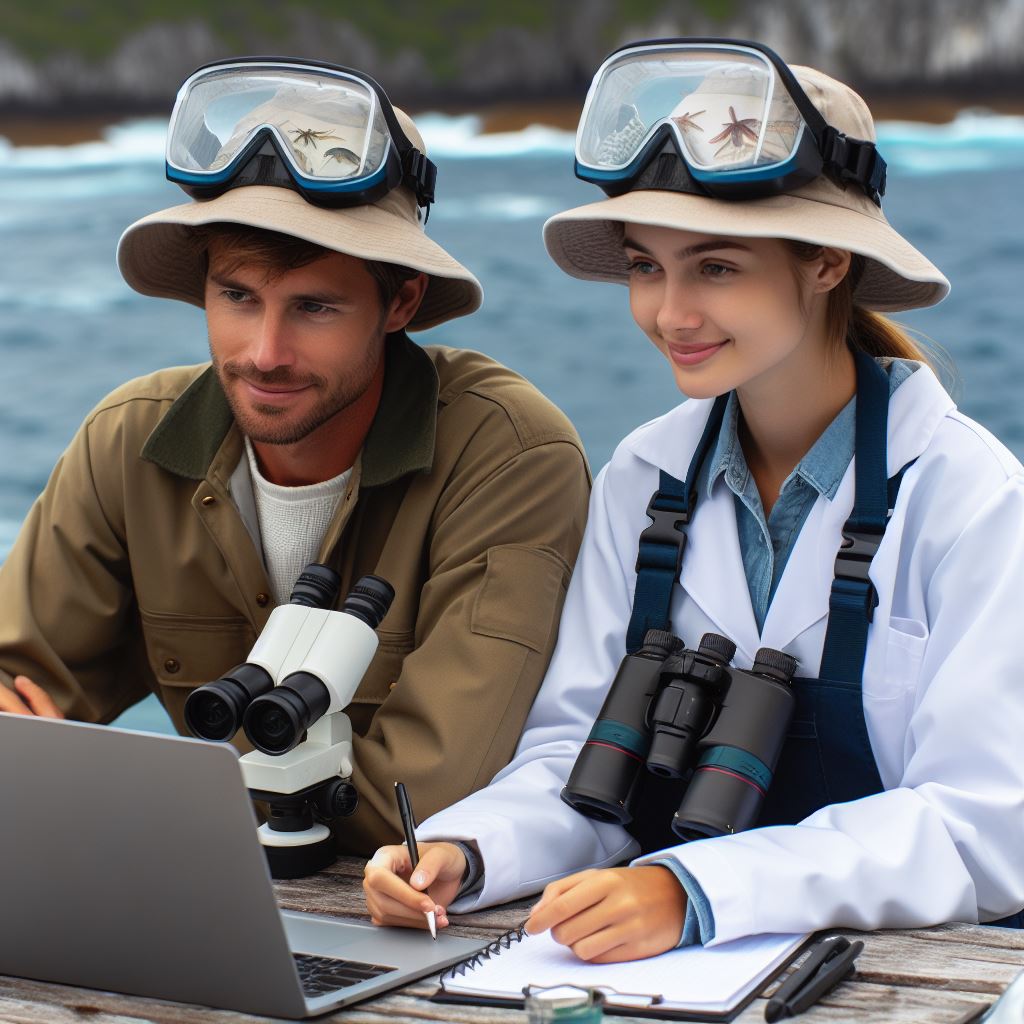Introduction
Embarking on a career as a marine biologist in Australia offers abundant opportunities.
Australia’s vast coastline and marine biodiversity present diverse career paths.
This section explores challenges and avenues in understanding and conserving marine ecosystems.
Marine biologists, in research institutions or government agencies, contribute to scientific knowledge and environmental sustainability.
Passionate about marine conservation, fisheries management, or marine research? Australia’s field caters to all interests.
Delve into career trajectories, educational pathways, and marine biologists’ impact on unique environments.
They study iconic species like the Great Barrier Reef’s coral formations and explore the Southern Ocean’s depths.
Understanding marine ecosystems is crucial amidst challenges like climate change, pollution, and overfishing.
Marine biologists need diverse skills from fieldwork to data analysis due to the field’s interdisciplinary nature.
They address pressing environmental issues and promote sustainable practices.
This section provides insights for students and professionals considering marine biology careers.
Through interviews, educational explorations, and industry insights, readers navigate this dynamic field.
Explore Australian marine biology careers, where passion meets purpose, shaping marine conservation’s future.
Research and Academic Positions
Description of research-focused career path for marine biologists
A research-focused career path for marine biologists involves conducting scientific investigations in marine environments to gain a better understanding of marine life and ecosystems.
Marine biologists in research positions focus on designing and executing experiments, collecting data, analyzing results, and publishing research findings.
Your Personalized Career Strategy
Unlock your potential with tailored career consulting. Get clear, actionable steps designed for your success. Start now!
Get StartedThey are involved in studying various aspects of marine life, including behavior, physiology, genetics, ecology, and conservation.
Research marine biologists may work with different marine organisms, such as fish, sharks, whales, dolphins, turtles, and corals, depending on their specific area of interest.
Overview of the academic requirements and qualifications
To pursue a research-focused career in marine biology, individuals typically need to obtain an advanced degree.
Most research positions require at least a master’s degree in marine biology, although a Ph.D. is often preferred for higher-level positions.
During their academic journey, aspiring marine biologists should focus on relevant coursework, such as marine ecology, oceanography, biology, and statistics.
Fieldwork and laboratory experience are also essential, as they provide valuable hands-on training and skills necessary for research.
Potential institutions and organizations for research opportunities
Marine biologists interested in research can find opportunities in various institutions and organizations in Australia.
Australian Institute of Marine Science (AIMS) is a leading research organization focusing on the study of marine ecosystems and sustainable management.
The Commonwealth Scientific and Industrial Research Organisation (CSIRO) also conducts research on marine biology, including aspects of climate change, biodiversity, and conservation.
Furthermore, marine research is carried out in universities like the University of Queensland, James Cook University, and the University of Western Australia.
Advantages and challenges of pursuing a career in research and academia
Advantages
- Opportunity to contribute to scientific knowledge and understanding of marine ecosystems.
- Work on important environmental conservation efforts and contribute to policy-making decisions.
- Flexibility in research topics and projects, allowing for personal interests and specialization.
- Potential to collaborate with other researchers, both national and international, fostering a global network of experts.
Challenges
- Intense competition for research funding and limited availability of positions in academia.
- Long hours of research work, including fieldwork, data analysis, and grants/proposal writing.
- Continuous need to keep up with the latest developments and advancements in the field.
- Potential difficulty in balancing research, teaching, and administrative responsibilities in academic positions.
Despite the challenges, pursuing a career in research and academia as a marine biologist can be incredibly rewarding.
Contributing to the understanding and preservation of marine ecosystems is crucial for the long-term sustainability of our planet’s oceans.
By conducting innovative research and sharing knowledge, marine biologists play a vital role in protecting our marine biodiversity and ensuring a healthier future for all.
Conservation and Environmental Organizations
The role of marine biologists in conservation efforts
Marine biologists play a crucial role in conservation efforts by studying the marine ecosystem, conducting research, and implementing strategies to protect and preserve marine species and habitats.
They focus on understanding the impact of human activities on marine life and finding solutions to mitigate these effects.
Stand Out with a Resume That Gets Results
Your career is worth more than a generic template. Let us craft a resume and cover letter that showcase your unique strengths and help you secure that dream job.
Get HiredOverview of different conservation and environmental organizations in Australia:
Australia is home to several renowned conservation and environmental organizations that work towards the protection and conservation of marine ecosystems.
Some prominent examples include the Australian Marine Conservation Society (AMCS), Great Barrier Reef Foundation, Sea Shepherd Australia, and World Wildlife Fund (WWF) Australia.
The varied work opportunities within these organizations:
These organizations offer a wide range of work opportunities for marine biologists, including research positions, fieldwork, advocacy and policy development, education and outreach, and community engagement.
Marine biologists can also find work in government agencies, universities, and private consulting firms. The roles and responsibilities can vary depending on the organization and the specific project.
Examples of successful projects conducted by marine biologists in conservation:
- The Australian Marine Conservation Society, in collaboration with local communities and stakeholders, successfully campaigned for the establishment of a network of marine parks to protect critical habitats and vulnerable species.
- The Great Barrier Reef Foundation has funded numerous scientific research projects aimed at understanding the impacts of climate change on the reef and developing strategies to enhance its resilience.
- Sea Shepherd Australia has been actively involved in direct action campaigns to protect marine species, such as the campaigns against illegal fishing and whaling.
- The World Wildlife Fund Australia has implemented innovative conservation programs, such as the Great Barrier Reef Turtle Health Program, which focuses on monitoring and protecting sea turtles and their nesting sites.
These examples demonstrate the significant contributions of marine biologists in conservation efforts and their instrumental role in protecting the marine environment in Australia.
Read: Navigating Chem Grad Studies in Australia
Government and Regulatory Bodies
Explanation of the role of marine biologists in government and regulatory sectors.
Marine biologists play a crucial role in the government and regulatory sectors by providing scientific expertise and guidance on matters related to marine biology.
Different government departments and agencies related to marine biology.
- Department of the Environment and Energy: Responsible for developing policies to protect marine ecosystems and species.
- Great Barrier Reef Marine Park Authority: Manages and protects the Great Barrier Reef, a globally significant marine ecosystem.
- Australian Institute of Marine Science: Conducts research to support sustainable management of Australia’s marine resources.
- Commonwealth Scientific and Industrial Research Organisation (CSIRO): Undertakes marine research and collaborates with government agencies.
The range of responsibilities and job opportunities available.
Marine biologists in government and regulatory bodies have diverse responsibilities, such as
- Conducting scientific research to assess the health and status of marine ecosystems.
- Developing and implementing policies and regulations to conserve and manage marine resources.
- Monitoring and enforcing compliance with environmental laws and regulations.
- Providing technical advice and recommendations to policymakers and stakeholders.
- Collaborating with other government agencies, research institutions, and international bodies.
Job opportunities in this sector include
- Marine ecologist: Studying the interactions between organisms and their marine environments.
- Marine conservation officer: Developing and implementing conservation strategies.
- Marine resource manager: Overseeing the sustainable use and protection of marine resources.
- Policy analyst: Assessing the impacts of policies and regulations on marine ecosystems.
Importance of policies and regulations in the field of marine biology.
Policies and regulations play a vital role in protecting and conserving marine ecosystems and species.
They help ensure the sustainable use of marine resources, prevent overfishing, manage pollution, and address climate change impacts.
By following these policies and regulations, marine biologists contribute to the long-term health and resilience of marine ecosystems.
Through their work in government and regulatory bodies, they help shape policies and decisions that have a significant impact on marine environments.
Basically, marine biologists play a vital role in government and regulatory sectors, working to safeguard marine ecosystems and species through scientific research, policy development, and enforcement of regulations.
They collaborate with various government departments and agencies, contributing to the sustainable management of marine resources.
Policies and regulations are crucial in this field, as they ensure the protection and conservation of marine ecosystems for future generations.
Read: The Future of Green Chemistry in Australia
Transform Your LinkedIn for Maximum Impact
Elevate your professional brand with a LinkedIn profile that attracts recruiters, showcases your expertise, and maximizes opportunities. Stand out in your industry with a profile built for success.
Boost Profile
Find Out More: Lab Tech Specializations in Australia
Education and Outreach
Overview of the educational role of marine biologists
- Marine biologists play a crucial role in educating the public about marine ecosystems and conservation.
- They use their knowledge and expertise to bridge the gap between scientific research and public understanding.
- Through education and outreach programs, marine biologists aim to increase awareness and appreciation for the marine environment.
- They strive to generate interest in marine science and inspire the next generation of scientists.
Career options in marine education and outreach
- Marine biologists pursuing a career in education and outreach have several options available to them.
- Many work in schools or colleges as marine science teachers, sharing their knowledge with students.
- Others join environmental organizations and non-profits, where they develop and deliver educational programs.
- Some marine biologists become educational consultants, providing expertise to curriculum development projects.
Description of different platforms for public engagement and science communication
- Marine biologists engage with the public through various platforms to communicate their scientific findings.
- They may write popular science articles for magazines, newspapers, or online publications.
- Some use social media platforms to reach a wider audience and share their knowledge in an accessible way.
- Others give public lectures, participate in panel discussions, or appear on television and radio programs.
Importance of educating the public about marine ecosystems and conservation
- Educating the public about marine ecosystems and conservation is crucial for their protection and sustainable management.
- By raising awareness, marine biologists can inspire individuals to make informed decisions that positively impact the oceans.
- Public education fosters a sense of responsibility and empowers communities to take action for marine conservation.
- It helps people understand the interconnectedness of marine ecosystems and the importance of preserving biodiversity.
Generally, marine biologists play a vital role in education and outreach. They bridge the gap between scientific research and public understanding by sharing their knowledge and expertise.
Through various career options and platforms, they engage with the public, inspiring interest in marine science and promoting conservation.
Educating the public about marine ecosystems and conservation is essential in fostering awareness, responsibility, and action for the protection of our oceans.
Read: Must-Attend Chemistry Conferences in Aus
Discover More: Enviro Science Tech: Tools of the Trade in Aus
Industry and Private Sector
The role of marine biologists in the industry and private sector
Marine biologists play a crucial role in the industry and private sector by conducting research and providing expertise on various marine-related areas.
Career opportunities in fisheries, aquaculture, and marine research companies
- Fisheries: Marine biologists can work in fisheries to ensure sustainable management of marine resources.
- Aquaculture: Opportunities exist in this sector for marine biologists to improve aquaculture practices and enhance production.
- Marine Research Companies: Many companies hire marine biologists to conduct research focused on understanding and conserving marine ecosystems.
Description of the skills and knowledge required for these positions
- Strong scientific background: Marine biologists need a solid foundation in biology, ecology, and oceanography.
- Research skills: Proficiency in designing and conducting experiments, collecting and analyzing data, and publishing findings.
- Fieldwork experience: Ability to conduct research in various marine environments and work with marine species.
- Knowledge of regulations: Understanding of legal and regulatory frameworks governing marine industries.
- Communication and collaboration: Excellent communication skills, both written and verbal, to work effectively with teams and stakeholders.
Importance of sustainable practices within the industry
- Environmental preservation: Sustainable practices ensure the long-term health and resilience of marine ecosystems.
- Economic viability: Sustainable practices safeguard industries dependent on marine resources, such as fisheries and aquaculture.
- Social responsibility: Promoting sustainability aligns with ethical considerations and societal expectations for responsible resource use.
In the industry and private sector, marine biologists contribute to a wide range of activities.
Read: Innovative Chemistry Startups in Australia
Conclusion
Summary of the career paths discussed for marine biologists in Australia
In closing, there are several career paths available for marine biologists in Australia. These include research positions, conservation and management roles, as well as opportunities in education and outreach.
Despite the challenges, a career in marine biology can be highly rewarding.
Encouragement for aspiring marine biologists to explore different options
For aspiring marine biologists, it is important to explore different options and gain a diverse set of skills and experiences. Building a strong foundation in scientific research and fieldwork can open doors to various opportunities in this dynamic field.
Final thoughts on the future prospects and importance of this field in Australia
Looking ahead, the future prospects for marine biologists in Australia are promising. With increasing awareness about the importance of marine ecosystems and the need for their conservation, there will be a growing demand for skilled professionals in this field.
As Australia is home to unique and diverse marine life, the work of marine biologists is crucial in understanding and protecting these ecosystems. Their research and efforts contribute to the sustainable management and conservation of our oceans.
Lastly, a career as a marine biologist in Australia offers exciting possibilities and the chance to make a significant impact on marine conservation. So, if you have a passion for marine life, don’t hesitate to pursue your dreams and contribute to the preservation of our precious oceans.




